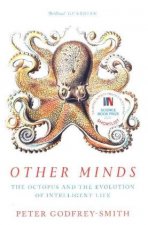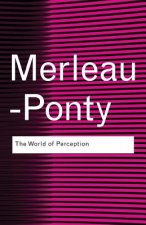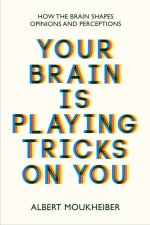
Kód: 04612267
System Theories and A Priori Aspects of Perception
Autor J. S. Jordan
This book takes as a starting point, John Dewey's article, The Reflex Arc Concept in Psychology, in which Dewey was calling for, in short, the utilisation of systems theories within psychology, theories of behaviour that capture i ... celý popis
- Jazyk:
 Angličtina
Angličtina - Väzba: Pevná
- Počet strán: 366
Nakladateľ: North-Holland, 1998
- Viac informácií o knihe

Mohlo by sa vám tiež páčiť
Darčekový poukaz: Radosť zaručená
- Darujte poukaz v ľubovoľnej hodnote, a my sa postaráme o zvyšok.
- Poukaz sa vzťahuje na všetky produkty v našej ponuke.
- Elektronický poukaz si vytlačíte z e-mailu a môžete ho ihneď darovať.
- Platnosť poukazu je 12 mesiacov od dátumu vystavenia.
Viac informácií o knihe System Theories and A Priori Aspects of Perception
Nákupom získate 665 bodov
 Anotácia knihy
Anotácia knihy
This book takes as a starting point, John Dewey's article, The Reflex Arc Concept in Psychology, in which Dewey was calling for, in short, the utilisation of systems theories within psychology, theories of behaviour that capture its nature as a vastly-complex dynamic coordination of nested coordinations. This line of research was neglected as American psychology migrated towards behaviourism, where perception came to be thought of as being both a neural response to an external stimulus and a mediating neural stimulus leading to, or causing a muscular response. As such, perception becomes a question of how it is the perceiver creates neural representations of the physical world. Gestalt psychology, on the other hand, focused on perception itself, utilising the term Phenomenological Field; a term that elegantly nests perception and the organism within their respective, as well as relative, levels of organisation. With the development of servo-mechanisms during the second world war, systems theory began to take on momentum within psychology, and then in the 1970s William T Powers brought the notion of servo-control to perception in his book, "Behavior: The Control of Perception". Since then, scientists have come to see nature not as linear chain of contingent cause-effect relationships, but rather, as a non linear, unpredictable nesting of self referential, emergent coordinations, best described as Chaos theory. The implications for perception are astounding, while maintaining the double-aspect nature of perception espoused by the Gestalt psychologists. In short, system theories model perception within the context of a functioning organism, so that objects of experience come to be seen as scale-dependent, psychophysically-neutral, phenomenological transformations of energy structures, the dynamics of which are the result of evolution, and therefore, a priori to the individual case. This a priori, homological unity among brain perception and world is revealed through the use of systems theories and represents the thrust of this book. All the authors are applying some sort of systems theory to the psychology of perception. However, unlike Dewey we have close to a century of technology we can bring to bear upon the issue. This book should be seen as a collection of such efforts.
 Parametre knihy
Parametre knihy
Zaradenie knihy Knihy po anglicky Society & social sciences Psychology Cognition & cognitive psychology
269.12 €
- Celý názov: System Theories and A Priori Aspects of Perception
- Autor: J. S. Jordan
- Jazyk:
 Angličtina
Angličtina - Väzba: Pevná
- Počet strán: 366
- EAN: 9780444826046
- ISBN: 0444826041
- ID: 04612267
- Nakladateľ: North-Holland
- Hmotnosť: 680 g
- Rozmery: 234 × 156 × 22 mm
- Dátum vydania: 21. April 1998
Obľúbené z iného súdka
-

Thinking, Fast and Slow
13.41 € -9 % -

Thinking, Fast and Slow
21.19 € -

How Emotions Are Made
11.36 € -21 % -

The Paradox of Choice
13.71 € -21 % -

Five Minds for the Future
23.65 € -19 % -

Frames of Mind
20.37 € -22 % -

The Art of Thinking Clearly
7.88 € -22 % -

250 Brief, Creative & Practical Art Therapy Techniques250 Brief, Creative & Practical Art Therapy Techniques
30.92 € -18 % -

Multiple Intelligences
22.72 € -

Other Minds
10.95 € -24 % -

Theory of Human Motivation
6.44 € -12 % -

Hare Brain, Tortoise Mind
17.40 € -5 % -

Gödel, Escher, Bach
21.90 € -17 % -

The Memory Illusion
11.46 € -21 % -

Where Good Ideas Come From
12.28 € -23 % -

Present Moment in Psychotherapy and Everyday Life
43.92 € -5 % -

Courage to Create
13.20 € -18 % -

MINDWARE: TOOLS FOR SMART THINKING
15.66 € -18 % -

Chaos, Creativity, and Cosmic Consciousness
18.01 € -1 % -

Love & Will
16.17 € -16 % -

Thinking and Reasoning: A Very Short Introduction
10.85 € -10 % -

White Bears and Other Unwanted Thoughts
21.70 € -

Mind in Motion
33.48 € -7 % -

Genius Frequency
24.87 € -

Willpower
12.28 € -23 % -

Enigma of Reason
12.48 € -21 % -

WHY WE LOVE
19.55 € -9 % -

Geography of Thought
12.07 € -19 % -

Getting Started with EEG Neurofeedback
45.77 € -10 % -

Cognitive Neuroscience
70.86 € -

Eyewitness Testimony
51.30 € -

World of Perception
29.59 € -

Trauma and Memory
18.53 € -20 % -

Risk Savvy
11.05 € -23 % -

How We Learn
15.45 € -16 % -

Patient H.M.
12.28 € -23 % -

Visual Thinking
20.16 € -15 % -

Your Brain Is Playing Tricks On You
11.66 € -19 % -

Biggest Bluff
13.10 € -9 % -

Visible Learning and the Science of How We Learn
49.76 € -

Face Value
43.62 € -

Power of Mindful Learning
15.04 € -20 % -

Wednesday Is Indigo Blue
44.54 € -

Handbook of Color Psychology
76.59 € -

Searching For Memory
36.14 € -

Natural History of Human Thinking
24.67 € -4 % -

Medieval Craft of Memory
35.32 € -2 % -

Oxford Handbook of Suicide and Self-Injury
65.02 € -

Noise
25.49 €
Osobný odber Bratislava a 2642 dalších
Copyright ©2008-24 najlacnejsie-knihy.sk Všetky práva vyhradenéSúkromieCookies






 21 miliónov titulov
21 miliónov titulov Vrátenie do mesiaca
Vrátenie do mesiaca 02/210 210 99 (8-15.30h)
02/210 210 99 (8-15.30h)